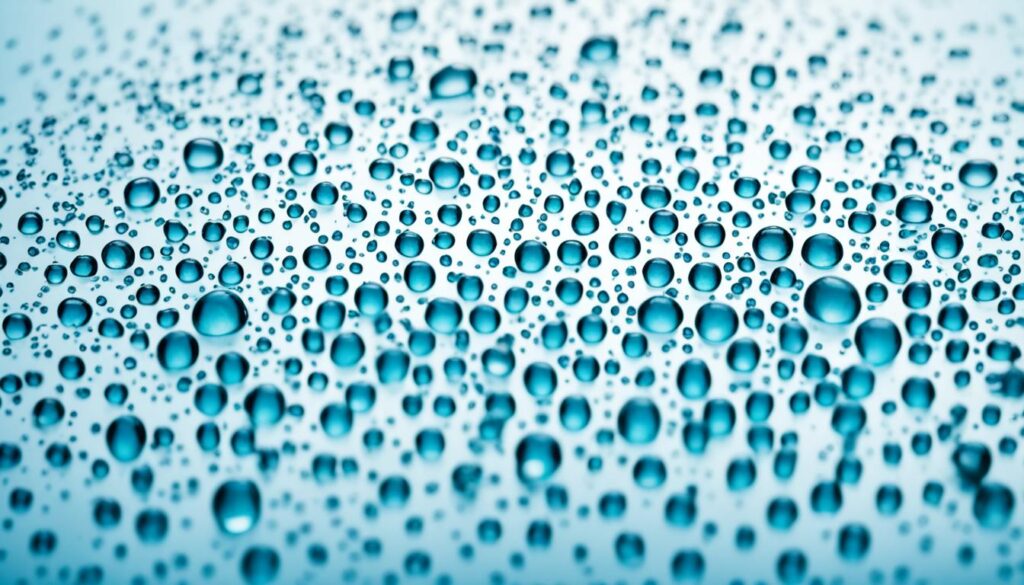Starting a water fast can be a great way to boost our health. But, it’s key to keep our electrolyte balance during fasting. Electrolytes like sodium, chloride, potassium, and magnesium are crucial. They help prevent headaches, fatigue, and muscle cramps.
These symptoms can show up in the first 24-48 hours of fasting. This means our body is running low on these important minerals.
When we start fasting, whether for a short or long time, we need to focus on getting enough electrolytes. It’s important to start with electrolyte supplements for fasting early. We should adjust them based on how our body reacts and the length of the fast.
Being strategic and flexible is key to staying energized and healthy while fasting. For more tips on staying hydrated and keeping electrolytes in check, check out the hydration tips during water fasting guide.
Key Takeaways
- Electrolytes are essential minerals for the normal functioning of the body’s systems and organs.
- Symptoms of electrolyte deficiency during fasting can include headaches, fatigue, and muscle cramps.
- Electrolyte supplements such as sodium, chloride, potassium, and magnesium are critical during extended fasts.
- Factors like fasting duration, body composition, exercise level, and water intake affect individual electrolyte needs.
- Personalize your electrolyte supplementation based on symptoms experienced during fasting.
Understanding Electrolytes: What Are They and Their Importance?
Electrolytes are key minerals that carry an electric charge. They are vital for many body functions. These include sodium, potassium, magnesium, and calcium. Knowing how electrolytes help during water fasting is crucial for staying healthy and keeping the body running smoothly.
Essential Minerals for Bodily Functions
Electrolytes are crucial for many tasks. They help balance water levels, make muscles work, and send nerve signals. For example, sodium levels should be between 135 to 145 mmol/L. If not, you might feel tired or have muscle twitches. Potassium levels also matter, staying between 3.6 to 5.5 mmol/L.
When fasting, it’s important to keep an eye on these electrolyte levels. You can get them from foods like bananas, avocados, and dairy. For more info, check out this guide on electrolytes for fasting.
Electrolytes and Hydration
Keeping hydrated is a big plus of watching electrolytes, especially when fasting. Not drinking enough water can cause serious problems like kidney issues or an irregular heartbeat. That’s why electrolytes are so important during water fasting. Our usual diet gets us sodium from table salt and potassium from fruits and veggies, helping us stay hydrated.
Here’s a quick look at where you can find electrolytes in your diet:
| Electrolyte | Common Sources |
|---|---|
| Sodium | Table salt, cheese, pickled foods |
| Potassium | Bananas, avocados, sweet potatoes |
| Magnesium | Seeds, nuts |
| Calcium | Dairy products, green leafy vegetables |
It’s important to balance these electrolytes, either through food or supplements, while fasting. This helps avoid dehydration and muscle problems. By doing this, we can have a successful fasting experience. Let’s keep learning and make good choices for our health!
Why Electrolyte Balance is Crucial During Water Fasting
Electrolytes play a big role in our health, especially when we fast. They help with many body functions, like keeping our muscles and nerves working right. When we fast, we might not get enough nutrients, so it’s key to keep our electrolytes in check.
Maintaining Fluid Balance
Keeping our body’s fluid balance is key during a fast. Sodium helps with this by keeping the fluid outside our cells in check. But fasting can make us lose a lot of sodium, up to 5,700 mg in the first day. Normally, we need 4-6 grams of sodium every day to stay healthy.
After the first day, our sodium loss slows down. After ten days of fasting, we lose about 100 to 230 mg of sodium each day. Even with shorter fasts, keeping an eye on our sodium intake is important to stay hydrated.
Preventing Symptoms of Deficiency
Not having enough electrolytes can cause headaches and dizziness. Low sodium levels can lead to muscle cramps and even seizures. To avoid these problems, eating foods high in electrolytes or taking supplements can help.
A study showed that obese people who took electrolyte supplements while fasting for six weeks didn’t have big problems with their electrolytes. They lost about 56 pounds on average. This shows how important it is to keep our electrolytes balanced for health and weight loss.
Here’s a look at how much sodium we might lose in different fasting situations:
| Fasting Type | Initial Sodium Loss (mg) | Stabilized Sodium Excretion (mg/day) | Additional Sodium Loss for Type 2 Diabetes (mg) |
|---|---|---|---|
| 24-hour Fast | 1,100 – 5,700 | – | 1,610 – 2,553 |
| After 10 days of continuous fast | – | 100 – 230 | – |
| Intermittent Fasting (12-16 hours) | Low | – | – |
It’s important to manage our electrolyte levels to make fasting safe and healthy. Keeping an eye on our electrolytes helps us stay healthy and avoid problems related to their lack.
The Role of Electrolytes in Water Fasting: Staying Healthy
Fasting is a powerful practice that many people follow. It’s important to know how to keep our bodies healthy during this time. Managing electrolytes in fasting helps us stay healthy. Electrolytes like sodium, potassium, magnesium, and calcium are key for hydration, muscle work, and nerve signals.
When we fast with water, we stop getting our usual nutrients. This can lead to an electrolyte imbalance. This imbalance can cause fatigue, muscle cramps, dizziness, and heart issues. To avoid these problems, we need to add electrolytes back in.

We can add electrolytes with special waters and supplements. Brands like Essentia and Core Hydration offer sugar-free and calorie-free options. These are great for fasting without extra calories. Foods like fruits, vegetables, and dairy are also good sources, but they’re not as easy to use when fasting with only water.
Staying healthy during water fast means checking our electrolyte levels. We can do this with an electrolyte panel test. This test looks for imbalances and checks our acid-base balance and kidney work. It makes sure our fasting doesn’t harm our health.
| Electrolyte | Function | Sources |
|---|---|---|
| Sodium | Regulates blood pressure and fluid balance | Electrolyte water, salt, sports drinks |
| Potassium | Supports muscle function and nerve signals | Fruits, vegetables, electrolyte water |
| Magnesium | Facilitates enzyme functions | Leafy greens, nuts, seeds, supplements |
| Calcium | Strengthens bones and aids in muscle contractions | Dairy products, fortified drinks |
It’s important to know the good and bad of supplements. They’re handy but can have extra stuff that breaks the fast. So, choosing pure electrolyte sources is best for staying healthy during water fast.
Understanding electrolytes in fasting and how to keep them balanced helps us enjoy fasting more and stay healthy.
Which Electrolytes Are Most Important During Fasting?
When you fast, it’s key to keep the right balance of electrolytes for good health. Electrolytes like sodium, potassium, magnesium, and calcium are crucial, especially when you’re not eating for a long time. Let’s see why these electrolytes matter.
Sodium
Sodium helps keep fluids balanced and nerves working right. You need more sodium when fasting to avoid dehydration and muscle cramps. Aim for 250-450 mg, depending on how active you are. Longer fasts can make you lose sodium, so drinking electrolyte water helps refill it without breaking your fast. For example, LMNT has 1000mg of sodium, great for after exercise.
Potassium
Potassium works with sodium to balance fluids and keep the heart beating right. Not having enough potassium can cause headaches and tiredness during fasting. You should get about 200-300 mg of potassium. Ultima Replenisher gives you 250 mg per serving, which is good if you exercise while fasting.
Magnesium
Magnesium is important for many body functions, like making energy. You need 70-120 mg or 1-1.2 mg/kg of body weight while fasting. It helps prevent muscle cramps and keeps your heart healthy. Supplements like LMNT, with 60 mg of magnesium, help keep your levels steady while fasting.
Calcium
Calcium is key for strong bones and muscles. Even though it’s not as lost as sodium and potassium, it’s still important during fasting. Try to get about 65 mg, like in Ultima Replenisher, to keep your muscles and bones strong.
| Electrolyte | Role | Recommended Intake | Supplement Example |
|---|---|---|---|
| Sodium | Fluid balance, nerve function | 250-450 mg | LMNT – 1000 mg |
| Potassium | Heart rhythm regulation, fluid balance | 200-300 mg | Ultima Replenisher – 250 mg |
| Magnesium | Energy production, muscle function | 70-120 mg | LMNT – 60 mg |
| Calcium | Bone health, muscle function | 65 mg | Ultima Replenisher – 65 mg |
How to Maintain Electrolyte Balance While Fasting
Keeping electrolytes balanced during fasting is key to avoiding deficiency symptoms and staying healthy. Let’s look at some ways to keep electrolytes in check while fasting.
Electrolyte Supplementation Tips
Using electrolyte supplementation for fasting can really help. It’s important to pick supplements without sugars or extra fillers. Re-Lyte offers zero-calorie options that keep electrolytes up without breaking your fast. Always take these supplements in small amounts during the day, especially during Suhoor and Iftar in Ramadan.
Foods and Drinks That Help
Foods rich in electrolytes are great for natural replenishment. Eating bananas for potassium, spinach for magnesium, and dairy for calcium before and after fasting can be good. Also, electrolyte drinks without sugar, like Re-Lyte, help keep you hydrated without messing with ketosis.
Timing of Electrolyte Consumption
Electrolyte timing during fasting matters a lot. Our body takes in minerals best at certain times. For the best results, eat electrolytes during your eating times. For example, if you’re doing intermittent fasting, take your supplements before and after fasting. This way, you get the most out of them and stay balanced during fasting.
By using these tips, we can keep our electrolytes balanced. This makes fasting healthier and more effective. Managing electrolytes well supports hydration, muscle, and brain function. This makes fasting easier and more beneficial.
Potential Risks of Electrolyte Imbalance During Fasting
Fasting can bring many health benefits, but it’s important to know the risks of electrolyte imbalance. Electrolytes help with muscle and nerve work. If they’re not balanced, it can cause serious health problems.

Dehydration and Kidney Issues
Dehydration is a big worry during fasting, especially for kidney health. We need water to keep our fluids balanced. When we fast, we often drink less water, which can hurt our kidneys.
Feeling tired, dizzy, or weak can mean you’re losing too many electrolytes and fluids. If you don’t drink enough water and get enough electrolytes while fasting, you could get kidney stones or even kidney failure.
Muscle and Nerve Complications
Fasting can also affect your muscles. Electrolytes like sodium, potassium, and magnesium are key for muscle and nerve work. If these electrolytes are out of balance, you might get muscle cramps or heart rhythm problems.
Potassium is important for keeping the heart beat steady. Too much can be harmful and might cause a heart attack. Magnesium and calcium are also crucial for muscle and nerve health. Not having enough of these minerals can lead to sleep problems, headaches, and feeling dizzy.
So, if you’re thinking about fasting, pay attention to your electrolyte levels. Talk to a doctor before you start and keep an eye on how much electrolytes you’re getting. This can help avoid the bad effects of fasting and keep the good parts.
Natural vs. Synthetic Electrolyte Sources
Understanding the differences between natural and synthetic electrolyte sources is key. This knowledge helps us make smart choices, especially when fasting. Each type has its own benefits and drawbacks. This knowledge is crucial for keeping our electrolyte balance right and safe.
Benefits of Natural Sources
Natural sources like fruits, veggies, and dairy are full of more than just minerals. They also have vitamins, antioxidants, and other good stuff for our health. For instance, a cup of 100% watermelon juice has almost 6% of the daily potassium and magnesium we need. Eating a diet rich in whole foods gives us the electrolytes and many other nutrients our bodies need.
Let’s look at some examples:
- Coconut water: It has about 46 calories per cup and is full of potassium.
- Milk: It has electrolytes like calcium and potassium, plus protein and carbs.
- Tap water: Gives us 2-3% of our daily electrolytes per liter, including sodium, calcium, and magnesium.
Drawbacks of Synthetic Supplements
Synthetic supplements are easy to use and let us control how much we take. But, they have some downsides. Many sports drinks, like Gatorade and Powerade, have a lot of sugar—up to 30 grams in a 20-ounce bottle—and artificial colors. Some electrolyte waters can be expensive and don’t have much more electrolytes than regular tap water.
But, electrolyte tablets and powders can be a good choice. They have the right mix of sodium, potassium, magnesium, and calcium. Even so, depending too much on these might mean missing out on the nutrients whole foods offer.
It’s important to find a balance between natural and synthetic sources. This balance is key for staying healthy during fasts and other times.
Common Mistakes to Avoid When Managing Electrolytes
Managing electrolytes during fasting is key for good health. Avoiding too much electrolyte intake and knowing the signs of imbalance is crucial. These mistakes can really affect how we feel.
Over-supplementation
One big mistake is taking too many electrolyte supplements. Too much can cause serious health issues like hyperkalemia. It’s important to know the right amount to take. This way, we don’t risk getting too much.
Knowing how much we need each day helps us avoid problems. Sticking to the recommended amounts is key.
| Electrolyte | Daily Requirement |
|---|---|
| Sodium | 2,300 mg |
| Potassium | 3,500-4,700 mg |
| Calcium | 1,000-1,200 mg |
| Magnesium | 310-420 mg |
Ignoring Symptoms of Imbalance
Not paying attention to signs of electrolyte imbalance is another mistake. If we feel tired, dizzy, or have muscle cramps, it could mean we’re out of balance. These symptoms should not be ignored.
They could lead to serious health issues. So, it’s important to watch for these signs and fix them quickly. This keeps our body in balance.
Understanding our body’s needs and acting on them helps us reach our health goals safely.
Conclusion
As we wrap up our look at electrolytes and water fasting, it’s clear that balance is key. Our bodies need sodium, potassium, magnesium, and calcium to stay healthy while fasting. These minerals are crucial for our well-being during times without food.
Studies show we must watch our electrolyte levels closely while fasting. EJ Drenick et al. pointed out the role of potassium in the American Journal of Clinical Nutrition. H Maagoe’s study in Metabolism stressed the importance of managing sodium levels. These studies remind us that planning is vital for our health during fasting, whether it’s short or long-term.
Research in Clinical Science and the Journal of Applied Physiology also shows fasting’s benefits. It can lower blood sugar and insulin levels, improve insulin resistance, and help with weight loss. But, these effects may fade a few months after fasting. So, it’s important to follow a sustainable fasting plan with the right support.
By knowing the signs of electrolyte imbalance and getting advice from health experts, we can stay healthy and resilient while fasting. Let’s start our fasting journey with care and knowledge. Let’s focus on managing our electrolytes for lasting health and well-being.
Source Links
- Fasting Electrolytes
- How important are electrolytes when fasting?
- Electrolytes: Definition, Functions, Imbalance and Sources
- Electrolytes – StatPearls – NCBI Bookshelf
- Understanding The Essential Role Of Electrolytes In The Body
- Benefits of sodium while fasting (And how to get enough)
- Electrolytes: Types, Purpose & Normal Levels
- Water and Electrolytes – Recommended Dietary Allowances
- Electrolytes: Uses, imbalance, and supplementation
- Should You Drink Electrolytes While Fasting? | My Own Water
- Best Electrolytes for Fasting | HydrationReview
- Should you increase electrolyte intake during intermittent fasting
- Electrolytes for Fasting
- How Can I Replace Electrolytes While Fasting?
- Does Fasting Cause Electrolyte Imbalance?
- Fasting: How Does It Affect Your Heart and Blood Pressure?
- Rebalance, Replenish: 4 Sources of Electrolytes
- 8 Electrolytes Drinks to Add to Your Wellness Routine
- Electrolyte Water: Benefits and Myths
- 9 intermittent fasting errors, from eating too little to exercising too much
- Healthy Foods High in Electrolytes
- The 5 Most Common Fasting Mistakes—And How to Fix Them
- Fasting—A review with emphasis on the electrolytes
- What Is Water Fasting? Benefits, Risks And More




